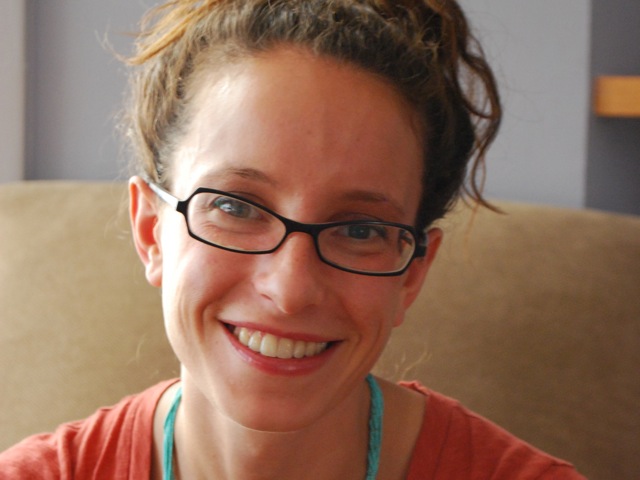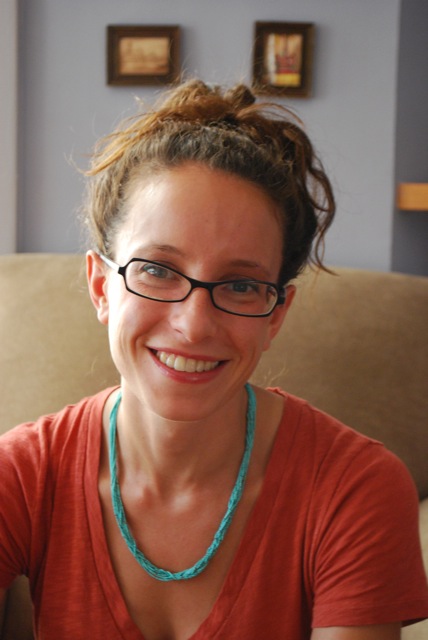
bookcover, l
(article, Vijaysree Venkatraman)
[%pageBreakSettings nobreak=true] p(blue). We humans use a combination of our five senses — sight, sound, touch, smell, and taste — to navigate the everyday world. Among those who operate without the benefit of one or more of these senses, the blind and the deaf have our immediate sympathy. But what of a person who cannot smell — an anosmic? Can we even begin to fathom her frustration? p(blue). Smell is an undervalued sense. When we can drink in the scents and odors around us, it is hard to appreciate how good we have it. Sure, we've all suffered from colds, which can make it impossible to enjoy a fragrant soup or, indeed, savor any favorite food properly for a few days. But what if that loss of olfaction is a more permanent condition? [%image mollybirnbaum float=right width=350 caption="Molly Birnbaum"] p(blue). In 2005, a car hit Molly Birnbaum, then a 22-year-old aspiring chef, while she was out for an early-morning jog. As she recovered from a host of injuries, including broken bones, she realized that her sense of smell had disappeared. Her olfactory nerves must have been severed when her head hit the windshield. p(blue). Birnbaum deferred her admission to the Culinary Institute of America and tried to come to terms with her loss (aided, in part, by blogging) by researching the science behind this phenomenon. Her 2011 memoir, Season to Taste, describes her sojourn in the land of odorlessness. What was the verdict handed out by your physicians after the accident? When I lost my sense of smell, one of the first doctors I went to see told me that it was gone for good. That there wasn’t anything I could do. That I should just wait. I wanted nothing more than to be a chef, though, so this verdict was devastating — without a sense of smell, I could not detect flavor. I was terrified that I would never be able to cook again. How important is smell when it comes to the world of food? Smell is a huge part of eating, and flavor. Without smell, I had the salty, sweet, bitter, sour, and umami of the taste buds on my tongue, but nothing more. Sure, I had texture and temperature. I could see the color on my plate. But smell is what gives us the nuance of flavor — the herbs, the spices, the familiarity. In all, everything that makes food recognizable and good. Without scent, it was like my world went from color to black and white. I couldn’t “taste” my food at all. Did losing your sense of smell impact other, non-culinary aspects of your life? Smell is intricately tied to memory and emotion, to feelings of safety and familiarity and place. Every person we love has a scent — boyfriends and girlfriends, husbands and wives, brothers and sisters, mothers, fathers, kids. There’s nothing quite like the scent of a newborn baby. Scent plays an important role in sex and the choices we make in our romantic partners. The environment around us loses its color; layers of texture disappear from the world. It surprised me that I felt this loss in so many ways other than the kitchen, but I did. What were the insights you gained into the science of smell from your research? I did a lot of reporting on the sense of smell in order to understand the science behind my injury, and to understand what was going on under the surface. I spoke with scores of scientists, researchers, doctors, chefs, and perfumers. I learned about how the nose works, and how we understand scent in the brain. I also learned scads about how smell infiltrates other aspects of our lives — parts far from just food. Scent is a powerful, mysterious sense, one that we know far less about than the others. I could have reported this book for many more years and still not reached the end. How did meeting the famous author and physician Oliver Sacks help? Dr. Sacks was one of the first scientists I met with to talk about my experience with the sense of smell — and certainly the first author I had ever met in person. He was an inspiration to me. He has built a career upon exploring the mysteries of the human body and writing about them in a narrative manner. Speaking with him helped me to understand that I could go out and ask the questions; I could try and make my loss make sense on a bigger scale. You also met celebrity chef Grant Achatz as part of your quest. I had the luck and pleasure to eat at Achatz’s restaurant, Alinea, in Chicago when I was writing my book, and after I had regained a good percentage of my sense of smell (it had been returning, slowly, for years). Achatz is a chef who truly understands the importance of smell — and all of the senses — and uses that in his cooking in different, fantastical ways. My meal lasted for hours, and vacillated between simply delicious and intellectually challenging. It was especially interesting to eat there, because Achatz was diagnosed with tongue cancer right in the midst of his meteoric rise in the world of restaurants and food. As a result of the treatment, he lost his ability to taste. While he did eventually recover — from both the cancer, and the treatment — he had to spend a good deal of time cooking without all of his senses. But he made it work. His experience was somewhat parallel to mine, and he was a huge inspiration. When and how did the smells start to come back? My sense of smell began to return very slowly, one scent at a time. It took years and years to fully recover. I’ll never forget that first aroma — I was helping my mother to cook dinner, a number of months after the accident that first robbed me of scent, and was chopping a pile of fresh rosemary for a marinade. All of a sudden, the aroma of rosemary flooded my nose — deep green, woodsy, like the earth. It was fantastic. But the rest of my recovery happened in slow motion. There were some strange occurrences along the way, including some mixups. One day, for example, I was driving again with my mother on a summer afternoon, the windows open, the breeze warm. I smelled something . . . something good. It smelled like baked goods. Like almond biscotti, I thought. I told my mom, and she looked at me like I was crazy. “Molly,” she said, “that’s a skunk.” [%image bookcover float=left] You also went to a perfume workshop in southern France. How did that help? I spent two weeks at a perfume “boot camp” in Grasse, France. There, I spent eight hours a day smelling the raw materials of perfume — both synthetics and naturals. I had never spent so much time, so intensely, smelling without much context. We students learned to apply labels to scents, and tested our ability to recall. I found it to be a very synesthetic experience, one combining smell with the other senses, especially sight and sound, as well as personal memories from my past. I left with a better sense of what was possible in the world of smell and a much greater appreciation for the art of perfume. When your sense of smell came back, you decided to stick with writing instead of being a chef. Why was that? Today I am not a professional chef, but I am a very passionate home cook. During the years I spent recovering my sense of smell, I spent most of my time writing, and falling in love with the possibility of words. Today I work as a cookbook editor in Boston. I continue to write. I continue to cook. We’ll see where both of my loves will take me in the future. What has your experience taught you about celebrating the sense of smell? It’s important to appreciate the little things: the scent of fresh-cut grass, garlic sautéing in butter on the stove. Though these things bring pleasure, it’s often undervalued. And you don’t know what it means, really, until it’s gone. Ever since I regained my sense of smell, I take care to notice the aromas around me, to pay attention to the colors and textures in the sensory world around me. It helps me to see my environment in a whole new way. p(bio). Vijaysree Venkatraman is a Boston-based science journalist.

bookcover, l

reference-image, l

mollybirnbaum, l